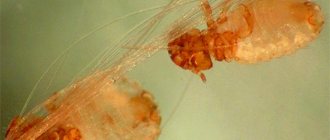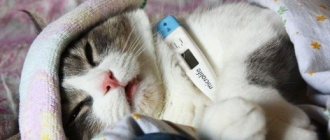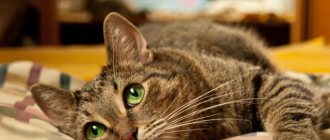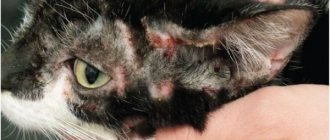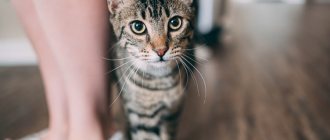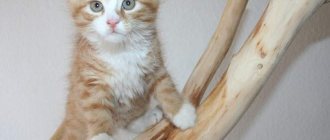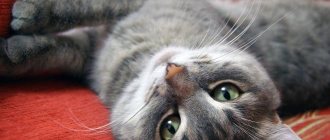Many people don’t even realize that cats have paraanal glands and what function they perform. However, recently, in animals that live in apartments, their blockage and inflammation are becoming more common.
That is why owners should know why cats need paraanal glands, what leads to blockage, and also how to prevent the development of pathology.
Function of the anal glands in cats
The anal glands in cats are small paired exocrine glands in the form of “sacs” that are located near the anus. They perform the following functions:
- Attracting the opposite sex during mating.
- Protection from their relatives or from large predators. Cats can secrete secretions to throw pursuing large predators off their scent. In addition, during conflicts between cats, the secret is released to disgust the enemy.
- Marking the territory to indicate one's own possessions.
- Recognizing other animals. Even for the human sense of smell, the smell of the secretion of the cat's paraanal glands is unpleasant. And cats and dogs can sense it even from a considerable distance.
- Participation in the metabolic processes of the body.
Unfortunately, in the comfortable conditions of the owner’s apartment, the cat’s paraanal glands do not have the opportunity to fully perform all their functions. Poor nutrition, decreased physical activity, lack of need to mark territory and attract partners lead to overflow of the paraanal ducts with secretions. Microbes begin to actively multiply in them, causing the glands to become inflamed, thereby causing the animal great discomfort.
When is it necessary to see a doctor?
If the owner himself could not cope with the problem, then the intervention of a veterinarian is necessary.
If you can’t get rid of your pet’s smell on your own by eliminating the provoking factor, or your pet stinks for a long time, then you should see a veterinarian. You should urgently see a specialist if your cat emits an ammonia or acetone “aroma.” You need to be especially careful with cats, since at an early age the diseases appear more acutely and progress more quickly. Be sure to contact a veterinary clinic if your cat not only stinks, but also exhibits other symptoms:
- changed stool - color, consistency, smell;
- frequent vomiting and nausea;
- loss of appetite;
- lethargy and apathy;
- poor pet appearance;
- hair loss;
- restlessness and pain when emptying the bladder.
Return to contents
Causes of inflammation of the paraanal glands in cats
Typically, the anal glands in cats clean themselves during defecation or “spraying” secretions when marking the territory. At the same time, a small amount of this secretion, which looks like a light liquid, enters into the animal’s sphincter and is then released.
If there are any problems in the functioning of the gastrointestinal tract, the peri-anal ducts become clogged, become inflamed and bulge outward. The color of their secretion becomes brown, the consistency becomes thick, and the smell becomes extremely unpleasant.
Interesting! Scientists have found that long-haired pets who live in apartments suffer from blockage of the paraanal glands more often than other cats. However, among all domestic cats, this pathology, according to research by felinologists, occurs only in 1.5–2% of animals.
Inflammation of the anal glands most often occurs for the following reasons:
- Dysbacteriosis due to long-term use of antibiotics.
- Elderly age.
- Injuries.
- Worm infestation.
- Obesity.
- Eating small bones.
- Feeding with natural products or cheap liquid feed.
- Lack of physical activity.
- Injury to the anus.
- Pregnancy.
- The gland canals are too narrow from birth.
- Frequent constipation or, conversely, diarrhea due to problems in the gastrointestinal tract.
When to contact a veterinarian
Be sure to seek advice from a specialist if the appearance of an unpleasant odor is accompanied by:
- an increase or decrease in temperature indicators;
- refusal of food;
- refusal of water;
- restless, anxious behavior;
- a sharp deterioration in the quality of coat and skin;
- intoxication of the body;
- problems with bowel movements and bladder emptying.
If an unpleasant odor emanates from a cat, it means that it is either not being properly cared for or the animal is sick. If hygiene standards are observed, it is better for owners to show their pet to a veterinarian, who will conduct a comprehensive examination, identify the factors that provoked the appearance of a “bad” odor and prescribe competent treatment.
When a cat stinks, there are physiological and pathological reasons. In the first case, the situation is less dangerous, and the unpleasant odor is associated with the diet and characteristics of the pet’s body. If the pet suddenly begins to smell bad, while other unpleasant symptoms and changes in the cat’s behavior are recorded, then this indicates pathology. If your kitten starts to smell, it is recommended to take him to the vet.
Signs of pathology
Signs of dysfunction of the paraanal glands in a furry pet should be detected by the owner in a timely manner. This will allow you to identify the causes of this condition as soon as possible and avoid unpleasant consequences for the cat’s health.
Owners should pay attention to the following symptoms that indicate inflammation of the paraanal gland in a cat:
- Weakness and apathy.
- An unpleasant odor from the animal's body that does not disappear after washing.
- Decreased appetite.
- Swelling and soreness of the anus.
- Increased body temperature (in some cases).
- “Riding on your butt” on the floor or other rough surface.
- Meowing during defecation due to painful sensations.
- Itching in the anus and skin in the back of the body.
- Problems with defecation – the cat cannot go to the toilet.
- Hair loss in the tail area.
- Constant licking under the tail.
If your pet develops pain and swelling in the anal area, as well as an unpleasant body odor, you should immediately consult a doctor. Otherwise, inflammation can cause the development of an abscess of the paraanal glands in a cat, which often leads to death.
Fetid and putrid odor from the mouth
Pleasant communication consists of a verbal component.
But in addition to words, on a subconscious level, a person evaluates his interlocutor by appearance, gestures and breath. More than a quarter of the world's population suffers from halitosis.
This is why most chewing gum advertisements are based on breath freshening. Indeed, menthol flavoring perfectly neutralizes putrid breath.
And clean breathing creates an attractive image of a person. An unpleasant odor can create problems in communication, cause discomfort and self-doubt; the extreme manifestation of this condition is depression.
It happens, of course, that a person exaggerates the problem and it seems to him that his breath is stale. With the so-called pseudohalitosis, a psychotherapist who will understand the causes of self-doubt helps a lot.
Treatment of the inflammatory process
Treatment of inflamed paraanal glands should only occur in a veterinary clinic under the supervision of a physician after a thorough examination and assessment of the severity of the lesion.
Therapy involves cleaning, rinsing or removing the affected glands.
Cleaning
At the initial stage of the disease, cats undergo cleaning of the paraanal glands. Depending on the consistency of the accumulated secretion, this procedure can be carried out in the clinic or at home by a visiting veterinarian or an experienced breeder. In any case, cleaning brings discomfort to cats, so it will be more convenient to do it together.
Before cleaning the glands from accumulated secretions, it is necessary to palpate them to determine the consistency of the contents.
If the secretion is liquid, you can clean it yourself using an external method. The animal should be secured, the inflamed glands should be covered with a napkin and their contents should be carefully squeezed out - to do this, you need to squeeze the sides of the anus with two fingers and squeeze.
If a liquid with a very pungent and unpleasant odor appears, the procedure can be considered successful. At the end of the manipulation, the anal area must be treated with Chlorhexidine.
If the contents of the glands are dense, the procedure should only be performed by a doctor, since the cat will need internal cleaning, which is called the rectal debridement method. In such a situation, the index finger is inserted into the animal’s rectum, the outside is felt with the thumb and the contents are gently squeezed out. At the end of the procedure, the anus is treated with an antiseptic solution, and ¼ of an anti-inflammatory suppository is inserted inside.
Important! It is forbidden to clean cats that do not have inflammation of the paraanal glands, since such intervention can lead to disruption of their normal functioning.
Washing
Washing should be carried out exclusively by a veterinarian in a clinic setting. This procedure is indicated in the most severe cases, when a fistula or abscess has formed, and other methods do not bring results.
First, the cat's anal glands are cleaned mechanically. Then, under local anesthesia, a solution of potassium permanganate, Chlorhexidine or another antiseptic is injected into the anus using a catheter or syringe without a needle.
The procedure must be repeated several times until the flowing liquid becomes clear. This will indicate that there is no thick secretion or pus left in the paraanal glands. Next, the cat is given rectal anti-inflammatory suppositories, and the outside of the anus is lubricated with antiseptic ointment.
Important! Depending on the severity of the disease, the animal may also be prescribed antibiotic therapy.
Removal
In the most severe cases, when it is no longer possible to clean and washing does not bring results, veterinarians remove the paraanal glands from cats. Doctors also recommend this operation for pets who constantly suffer from blocked ducts.
Regular cleaning is a significant stress for cats, so removing the anal glands will make life easier for both owners and their pets.
The removal operation is performed under general anesthesia. The doctor makes 2 small incisions in the area where the anal glands are located, removes them along with the ducts and applies sutures. In the future, the owners need to treat the wound with a healing preparation, and also give the cat vitamins for speedy skin regeneration and antibiotics (if indicated, for 5–7 days).
Important! Owners need to ensure that the cat does not become constipated until the stitches heal. Otherwise, they may separate.
Prevention measures
In order to maintain the health of the pet and not face such a problem as an unpleasant, pungent odor from the cat, owners should follow a number of recommendations:
- Maintain cleanliness. Regular cleaning of the litter box, washing and replacing covers on the cat's bedding will prevent even the faintest cat odor from spreading throughout the room.
- Bathe your cat as the need arises, taking into account age, lifestyle, and coat type.
- Take care of the cleanliness of the coat, comb it regularly, inspect the ears, nose, mouth, promptly clearing them of dirt.
Selection of food and proper feeding. No less important than maintaining hygiene standards is proper feeding of the cat. When using ready-made feeds, it is necessary to give preference to high-quality, good products. The use of low-quality industrial feed for a long time often causes an unpleasant odor from the cat’s fur, feces, and also from the oral cavity.
It is completely necessary to exclude foods such as salt, sugar, spices, smoked meats, sweets, and flour products from your pet’s diet.
Feeding such forbidden delicacies often provokes food allergies, damage to the sebaceous and skin glands, leading to the appearance of a foul odor.
What to do and how to deal with the problem?
It is possible to get rid of the unpleasant cat odor after identifying its origin. Sterilized cats require special attention, so the specialist must clarify whether sterilization was carried out. Before selecting treatment for a cat, they review its diet, since the problem is often associated with poor nutrition. It is possible to get rid of the disorder in a pet using the medications indicated in the table.
| Group | Name |
| Medicinal shampoos | "Oksidex" |
| "Baktoderm" | |
| Hexadene | |
| Antibiotics | "Cephalexin" |
| "Clindamycin" | |
| "Ampicillin" | |
| Drops for ear diseases or parasites | "Leopard" |
In advanced cases, when the pet smells strongly and veterinary remedies do not help, surgery is required. A radical measure is prescribed for cancer, serious problems with the kidneys and other internal organs. After the operation, it is necessary to pay increased attention to the cat; it is recommended to feed it tasty and proper food and take care of its hygiene.
Source
